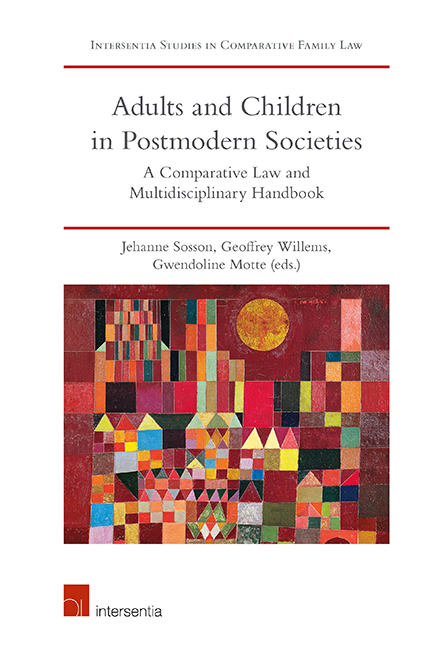Book contents
- Frontmatter
- Contents
- List of Cases
- List of Contributors
- Introduction
- PART I NATIONAL REPORTS ON LEGAL REGULATIONS OF RELATIONSHIPS BETWEEN ADULTS AND CHILDREN
- Questionnaire
- Models
- Algeria
- Argentina
- Australia
- Belgium
- Canada
- Democratic Republic of the Congo
- England and Wales
- France
- Germany
- Ireland
- Italy
- Japan
- The Netherlands
- Romania
- Spain and Catalonia
- Sweden
- Switzerland
- United States of America
- PART II INTERDISCIPLINARY APPROACH
- PART III INTERNATIONAL LAW INSIGHTS
- PART IV COMPARATIVE APPROACH
- General Conclusion: The Challenge of Transparent and Inclusive Parenthood/Parentality in a Pluralist and Cosmopolitan Context
- About the Editors
Algeria
from PART I - NATIONAL REPORTS ON LEGAL REGULATIONS OF RELATIONSHIPS BETWEEN ADULTS AND CHILDREN
Published online by Cambridge University Press: 26 June 2019
- Frontmatter
- Contents
- List of Cases
- List of Contributors
- Introduction
- PART I NATIONAL REPORTS ON LEGAL REGULATIONS OF RELATIONSHIPS BETWEEN ADULTS AND CHILDREN
- Questionnaire
- Models
- Algeria
- Argentina
- Australia
- Belgium
- Canada
- Democratic Republic of the Congo
- England and Wales
- France
- Germany
- Ireland
- Italy
- Japan
- The Netherlands
- Romania
- Spain and Catalonia
- Sweden
- Switzerland
- United States of America
- PART II INTERDISCIPLINARY APPROACH
- PART III INTERNATIONAL LAW INSIGHTS
- PART IV COMPARATIVE APPROACH
- General Conclusion: The Challenge of Transparent and Inclusive Parenthood/Parentality in a Pluralist and Cosmopolitan Context
- About the Editors
Summary
Algerian family law is mainly governed by the Family Code issued by the law promulgated on 9 June 1984 and revised in February 2005. Although it is doctrinally grounded on Muslim law, this text contains several provisions that diverge from it to some degree, or that have been inspired by rules originating from the legislation adopted by French authorities during the colonial era. They can also be based on principles established by the case law developed by the courts before and after Algeria's independence in 1962. We could thus say that family law in Algeria is shaped through an ongoing evolutionary process, which is clearly apparent when one compares its content at different moments of its history.
Thus, the provisions of family law currently in force diverge to some degree from classical Muslim law (fiqh), varying according to the matters involved. Indeed, a careful examination of the content of certain rules reveals a strong influence of contemporary legal frameworks and techniques on the work of the legislator. Nonetheless, to understand Algerian family law and its evolution, it is beneficial to situate its main provisions by relating them to the classical fiqh.
The rules of classical Muslim law related to persons and families were created through doctrinal work rather than elaborated by a legislative body in the institutional framework of a state. Their consecration as rules of positive law was thus the consequence of the choice made by the public authority (the sovereign) of the legal doctrine (madhab) which had to be applied by the judges (qâdi) appointed to determine disputes. Today, the legislator never omits a reminder that the rules laid down in family law matters are mainly inspired by Muslim law, although numerous rules set out in official texts originate from elsewhere. Accordingly, the law still mentions that, in the absence of formal legal provisions, the judge is required to find the applicable rule in this classical literature.
Knowledge of Algerian family law thus involves the study of texts emanating from positive law as well as works of Muslim law, taking into account the dominant doctrinal school to which the concerned persons belong.
- Type
- Chapter
- Information
- Adults and Children in Postmodern SocietiesA Comparative Law and Multidisciplinary Handbook, pp. 15 - 36Publisher: IntersentiaPrint publication year: 2019

